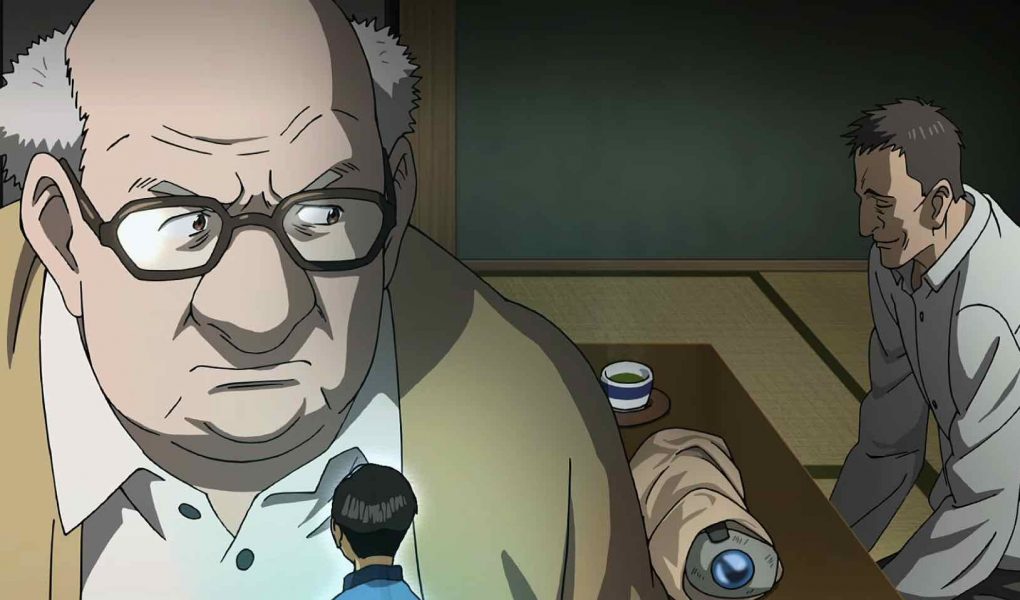I jumped into this episode, as I always have with Pluto, full of good intentions. Maybe I’m indulging a fantasy by blogging an episode a week as if it were released that way, but even if no one else follows that course it works for me. And I want to review every one in a way that does it justice, but sometimes a series just doesn’t lend itself to that. Obviously I was completely spellbound for the entire hour, but my instant reaction when it was over was “how the hell am I supposed to write about that?”.
We’re basically getting eight utterly brilliant movies strung together here, and it’s absolutely exhilarating. Seriously, this was so taut, so focused, so powerful – really a perfect piece of art. When you combine the likes of Tezuka and Urasawa of course you expect brilliance, but Maruyama and his team still had to capture their twinned genius on-screen. It’s not as if the production itself is relying on shock-and-awe animation or avant-garde direction. It’s elegant and simple, really, in a very old school Production I.G. way, and where it’s really flexing is with the acting and the sound design. You’re not going to get ensemble work much better than this, ever.
With that, I once again hardly know where to begin. Dr. Ochanomizu certainly stands out this time. He’s a man of immense kindness and compassion, to robot or human. Things start off innocently enough as he’s on an outing being watched out for by his constable-bot Yujiro (Hamada Kenji). Ochanomizu finds an early model robotic dog, and is determined to fix it even though it’s so obsolete he can’t even find the parts. Such a simple scene, the death of that little robot, but Ochanomizu’s reaction says so much about him that one can’t help but be caught up in the emotion of the moment.
“Goji” is another ghost robot in the hands of Professor Abullah. We already pretty much knew he was the one behind the murders, but the pieces are starting to fit together now. The Bora Commission is the target, the ones who went searching for RMDs and didn’t find them, but didn’t stop the Kingdom of Persia from being bombed flat in the 39th Central Asian War. Ochanomizu was on the commission and is thus a natural target, but Abullah here is mainly interested in using him – and his family – to draw out Atom. Ochanomizu stubbornly refuses to be blackmailed, but Atom intervenes on his own – first to save the professor, and then to go and save his family (to whose house Uran has already flown).
Seeing Atom in his full Astro Boy splendor is also kind of emotional, at least for me. Man’s greatest technological achievement, yet seemingly so human and so frail. Uran senses what that tornado is, and who the real target is here, and begs Atom to turn back. But if he did that he wouldn’t be Atom, noble soul that he is. There are people (and a robots) to be saved, and Atom is not capable of turning his back on them. But facing down Pluto has only resulted in one outcome so far, and not even Atom seems to be able to break the cycle of death.
The focus then turns to Gesicht and Adolf, whose story takes an unlikely and very Urasawa turn. Adolf has become a liability to his hate group thanks to his vendetta against Gesicht, who’s much more useful to them as a living symbol of the evils of robotics. So the leader orders Hass killed, and he winds up in Gesicht’s protection. Why bring in a high-ranking Europol detective to guard a seeming loser nobody like Adolf? It clearly has something to do with his brother, who seems to have been something more than a simply lowlife criminal.
Gesicht’s vacation certainly isn’t turning out as planned. He’s having a new nightmare, which he’s put in his “trash box”, where Dr. Hoffman advises him to keep it. He’s seen images of Atom’s death on television. And he’s assigned to guard a man who hates robots and wants him dead. Hass really is a pathetic little man, and it’s only when his life is again threatened that he throws over his prejudice and puts himself totally in Gesicht’s hands. But he too is more than he seems – his company installed the security cams at a notorious U.S. (of T) prison for war criminals in Persia. And he has video that proves most useful to Gesicht’s main case (and paints another target on Hass’ back).
As for Hoffman, he was on the Bora Commission and he too is a target. Hass seems almost moved by Gesicht’s concern for Hoffman. It’s Epsilon who winds up saving Hoffman, after his own creator (also a Bora member) is also murdered. Epsilon delivers Hoffman to Hercules’ protection, being unwilling to fight anyone himself, and Hercules is fine with this on the grounds that this is one more piece of bait to try and draw out Pluto again.
The scene stealer in the third act, however, is Dr. Tenma (Tsuda Eizou). He’s another DNA-level connection with Tetsuwan Atom of course – Atom’s creator, the greatest mind in science, the foremost creator of computerized brains. Except that Tenma denies being such, as he reasons that robot brains aren’t created, they grow. Grown from things like hatred and pain. Tenma was head of the science ministry before Ochanomizu – effectively making him Atom’s father and Ochanomizu his stepfather. And he met secretly seven years earlier with Hoffman and Epsilon’s creator, who hoped to join forces and create a super robot that could end all wars. But Tenma only showed up to warn them to stop trying to make robots more like humans – and then he dropped off the grid altogether.
It’s easy to speculate as to why Ochanomizu is trying to call Tenma at the end, but he’s not able to locate him. Tenma’s words hang over everything – including his dismissal of Atom as a “failure” (which Ochanomizu vehemently rejects). All that we’ve been told about robots up to this point, Tenma seems to refute. But the question of what he’s been up to these past seven years likewise hangs over everything. This all flows so effortlessly and fits together to perfectly that it’s hard not to surrender to awe. Pluto is great fiction that transcends medium, but I’m still very glad it was anime that wound up being its greatest showcase.
The post Pluto – 04 appeared first on Lost in Anime.




